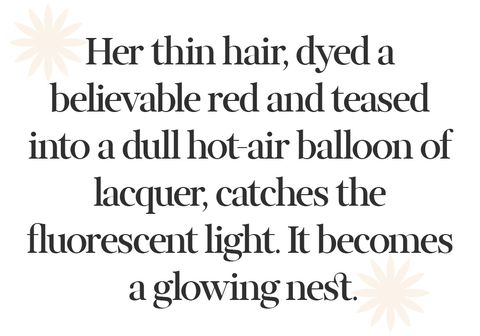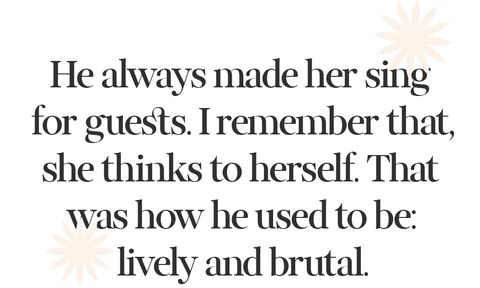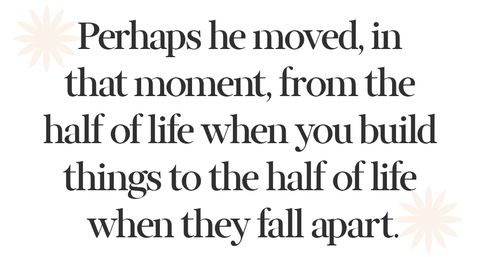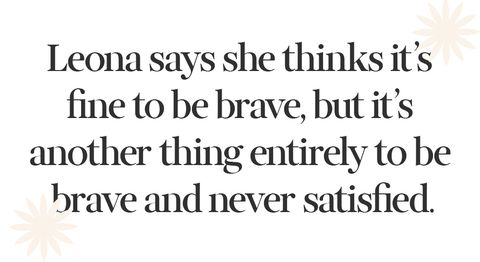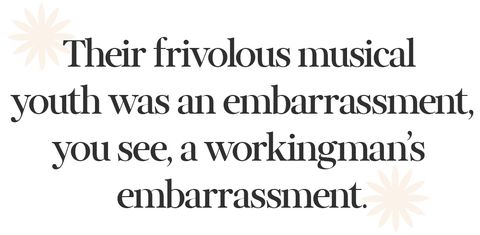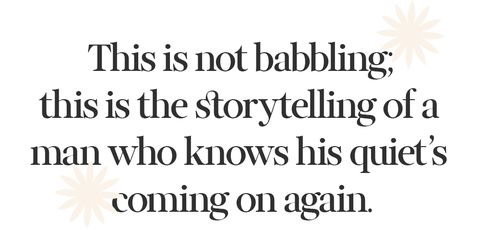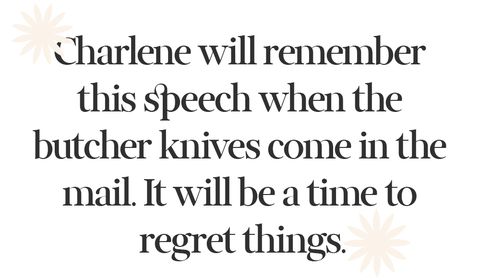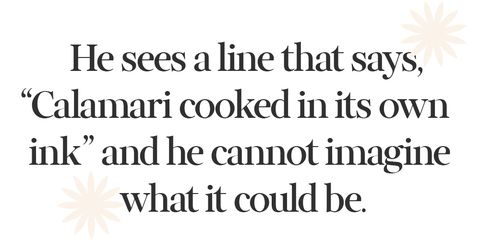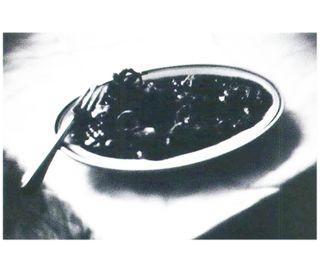This is Christmastime. The restaurant’s air is polished with reflections from bright Italian ornaments—red spindles, widemouthed angels, a donkey stamped from tin—but otherwise sits unchanged. To the Amalfi’s waiters, the odor of this air is ordinary, sharp with tomato and full of steam. Sometimes when the kitchen door opens, a foul waft comes through over to table 12: the scent of old mussel shells rotting in their juice. Paolo, the maître d’, always puts old people at table 12 because they cannot smell anything and cannot taste anything. This evening at 12, an old man sits, folding white napkins into rabbits. Paolo keeps supplying him with the napkins. The ice coating the old man’s shoulders is melting into the tweed, and he orders minestrone to warm himself. Table 7 is open for a party of five. A family.
That is the table for the Flynns. How many? Six—they have miscounted somehow. Charlene Flynn has counted her twin sons as one child. So, soon, another chair will have to be hunted up for the extra four-year-old. His name is Danny, and he will order, at the climax of the evening, a plate of “Calamari cooked in its own ink.” When the boy orders this simple squid, Paolo will notice a strange horror from the adults at the table. Paolo will wonder about these looks all night, wonder what could be so terrible about a little boy’s whim.
The Flynns are getting in the car. The car is still outside their house, surrounded by puffs of snow on either side, the thriftiest kind of snow. In Washington, the mayor has not allotted money for snowplows, so its fallen shapes will remain. The Flynns are all in snow jackets of artificial fibers, clutching themselves and thinking how clear and deadly the night air is—that if it drops one more degree the Flynns will freeze up like eels in a pond, caught in just these self-hugging positions of fear.
But, in fact, they aren’t all Flynns; two are Hagertons, Charlene’s parents visiting from Georgia. Fred Hagerton is talking to Alan Flynn about the car itself, a deep-blue Dodge Dart, a used car. They are discussing the advantages of a new car, and Alan Flynn is thinking that he and his wife cannot afford it, a new car, that his whole life his family has never had a new car. Fred Hagerton drives a new Cadillac. He and his wife also cannot afford it, on his butcher’s salary, but they are getting old, and when Fred went to war he promised Leona a new Cadillac one day if he lived, and he lived, and so he drives a new Cadillac.
Where is Leona? Still in the house. A small house, a first house. Mostly living room. A high coffee table sits in the middle, tiled with burnt-yellow squares, and around it are pieces of wooden furniture: a long-legged rocking chair from when the twins were babies, a dining-room chair set out for company, the lusterless leather couch with wings of teak (the great luxury of the room, the new Cadillac of the Flynns). A spider plant hangs above in a beaded macramé cradle. The walls of the room are thin and white. Paintings of abstract orange flowers cheer feebly above the couch.
Leona Hagerton, Charlene’s mother, is bent over the coffee table. Her thin hair, dyed a believable red and teased into a dull hot-air balloon of lacquer, catches the fluorescent light. It becomes a glowing nest. She leans over her purse and inserts a letter. It is a letter from soon-to-be-president Jimmy Carter, her boy from Georgia. It is an invitation to his ball in Atlanta. She is bringing it to the restaurant as evidence. It is to be used in her story of why she loves Jimmy Carter so. He invites her, little Leona Hagerton who dresses so poorly that she shivers in her long coat even in the house, Jimmy Carter invites her to parties. Of course, everybody in Georgia gets these invitations.
But that’s wrong. Jimmy Carter’s election is in November of 1976. But the twins were born in 1970 and cannot be six. Danny cannot order the squid at six and still seem to augur an unexpected, harder life. No, the story is wrong. The twins are four. But let it go. Let her be inserting a letter from Jimmy Carter nonetheless. It doesn’t matter.
Charlene is in a gray dress to please her mother, Leona. Leona has always forbidden her girls to wear red. It draws attention; it is the color of a whore. Charlene wears thick glasses and pats the heads of her twin sons. Her hair is barretted above her ears, and she is afraid it makes her nose larger. Her father, Fred, once told her she had a Roman nose: “It roams all over your face!” He always made her sing for guests. I remember that, she thinks to herself. That was how he used to be: lively and brutal.
So Fred and Leona have to be her parents, after all. They could never be Flynns.
Leona wears a pale-green pantsuit she bought at Sears. She is thin as a blade of grass. Her face is made up in pinks from Avon; she sells Avon back in Augusta, Georgia. For Christmas, she will give her daughter Avon perfume and the twins Avon Batman hairbrushes. She is worried, talking furiously about her neighbors to her daughter, although Charlene does not know her neighbors. This loud worrying comforts Leona. She would never speak of this comfort. Sometimes, she asks Fred a question—“Isn’t that right, Fred?” or “What was her name, Fred?”—but he doesn’t reply and she doesn’t expect him to.
Fred doesn’t talk, doesn’t tell stories anymore, or make his daughters sing, or bring home funny strangers to dinner. In 1960, a man came to the door, holding his hat over his chest, asking to talk to Fred. Charlene overheard the news: Two women had died in a car crash in Kentucky. She learned that this was her father’s first family, a wife and daughter he’d left for Leona twenty years before. Charlene shouted her rage at him for keeping it a secret, this whole other family he’d abandoned as a young man. Leona left the room, but Fred took his daughter’s fury. He stared at her red face and flying ponytail and began to shake. Perhaps he moved, in that moment, from the half of life when you build things to the half of life when they fall apart. Afterward, people would say he seemed “touched,” perhaps had come undone. Fred hushed and became this man, this kind, silent, dopey man in the front seat, just smiling without a word.
Fifteen years from now, Charlene will leave her own family, Alan and the grown-up twins. Her father, Fred, will mail her all his butcher knives, dull and half-rusted swords. It will be her old father, the defiant one who died in that car crash, who sends them. Charlene will open the tissue paper, kneeling, put a hand to her mouth, and swallow wordless grief.
But they are all dressed up tonight!
The twins are finally speaking in their secret language, because no one else is talking to them. You would never be able to tell, but they are making up a story. It’s about a green boy lost in a house and all the ghosts around him, but there’s another little boy there, also green, so it’s not so bad, it’s never so bad, then. Here’s what they sound like:
“Babba bitty boy gitta ghosty house, gitta ghosty babba round …”
They sound like babies.
They haven’t thought yet about the restaurant, or being hungry, or being cold, or the snot drying on their noses. Danny hasn’t planned that he will order the fateful squid.
But wait—why Danny? If they are twins, why wouldn’t Marky order the squid? They dress alike, talk the same languages, tell the same stories. At four years old, they are the focus of each other’s world, so why wouldn’t they both order the squid?
They are becoming different already. Marky, for instance, is very shy. He hides his red nose deep inside the fake-fleece hood of his coat. He lets Danny tell the frame of the ghost story. Marky knows the details and adds them only when necessary: a green boy. He likes to run very fast. He despises mushrooms—his father jokes that this is because he dropped Marky on his head as a baby.
Danny is louder, standing in the middle and yelling, La! La! La! until a parent notices him or Marky joins in. When he was three, he drew a picture of himself as a girl. Charlene found it. Danny got to see a psychoanalyst at only three. The man said not to worry, that Danny must have looked around him and seen only male-female couples—his parents, partners at daycare, his grandparents, Donnie and Marie Osmond—and thought that since Marky was obviously male, he must be female. This explanation did not dispel Charlene and Alan’s worries. So the psychoanalyst gave them a book called Growing Up Straight.
Leona knows about the drawing and the psychoanalyst. Charlene regrets telling her about it in her own, inherited, fit of worrying. And Leona is weird about it. She’s told Alan that when she was a little girl, all boys of three wore frilly dresses and curled their hair. That is to say, all children did. Boys grew out of it, and girls never did, and the time to worry was later. Alan glared at Charlene during this speech. And Leona has begun on this trip to pay a lot of attention to Danny, which is exactly what Growing Up Straight says not to do. Charlene is going to talk to her about it.
So there is already a subtlety to the twins. There is something quiet about Marky and something dangerous about Danny. The twins are quite unaware of all this. Marky does not remember being dropped on his head, and Danny already doesn’t remember the psychoanalyst or the drawing, which has been thrown away. Here’s all they say: “Babba bother bitty boy bidda ghosty house …”
And Leona is still talking. She is telling of her neighbor who puts up green tomatoes so that this time of year all of the cul-de-sac can eat relishes for Christmas. She tells of an Indian family who moved in down the street who gave Leona a bottle of chutney. Leona did not know what to do with it; it was not relish. She had no interest in it. But her sewing partner, Wilma, got all excited just to see it. So Leona gave it to her, because she seemed to want it, but she feels sorry for Wilma. Wilma only gets excitement out of new and different things. But Wilma is very sad. Leona says she thinks it’s fine to be brave, but it’s another thing entirely to be brave and never satisfied.
Fred nods and smiles at this story. He’s heard it before, and likes it this time, too.
And the car turns the corner and stops. The Flynns have arrived at the Amalfi!
Now they have to get out in the cold again. There is a moment of hesitation when Leona has to choose between the cramped backseat of the Dodge Dart or the frozen air outside. But everyone else is already outside. The twins are dancing around near the bumper, their mittens twirling from their wrists, and they have to be rounded up. Outside, the Amalfi is dark brick with an archway entrance. Dirty yellow lanterns light the side, and the windows are diamond-paned and multicolored. This, Leona thinks, is what a real Italian restaurant should look like.
The boys throw off their coats inside. They, too, are dressed up: both in ruffled shirts. Marky and Danny have wanted ruffled shirts for a whole year now, and Alan had to search all of Washington to find some. Neither parent has any idea where the boys saw them. Marky’s shirt is pink; Danny’s is light blue. The boys are always color-coded this way: Marky red; Danny blue. Their whole lives, the twins will claim each, respectively, in all honesty, as their favorite color.
Paolo guesses that these are the Flynns. The old man is eating his pear now, after letting the port seep in. Paolo admires the man for his imagination. Paolo walks up, smiling fiercely, with five menus. Coats are being flung onto hooks, and all of the Flynns are red-cheeked, eyebrows high as if surprised by the cold. Charlene explains that they are six. She must have counted the twins as one. Leona pinches Danny’s cheek and jokes that they almost forgot him. Danny stares at his beehived grandmother. Another waiter is sent to get the extra chair for the dangerous twin.
Again, all is Christmas inside the Amalfi. A Christmas tree studded with electric candles, the dented Italian ornaments speckling the walls with light, wicker-bottom bottles of Chianti strung everywhere. The tables spiral out from the tree: two white tablecloths draped at diagonals to each other. Paolo insists on the two cloths when he is maître d’. He saw it once in a magazine.
Leona is mildly flirtatious with Paolo. He smells her Avon perfume and can tell she has dressed up for the Amalfi. She tells him how handsome he is, even touches his cheek with a pink fingernail. And he is handsome; he has a Roman nose. Leona clicks her tongue when she notices he wears no wedding ring. Don’t Italian boys get married young? she asks. Paolo blushes, but under his dark skin, so no one can tell. The Anglo Flynns are blushing openly, though, blushing from the cold as if afire. Paolo doesn’t answer her question but smiles and gracefully passes out the menus.
Danny and Marky are speaking in their secret language. Alan makes them stop.
Paolo has left to help the old man at table 12 get up to leave. The man says, Back out into the cold! and chuckles. Paolo nods.
At table 7, Fred has begun to talk. Everyone else is quiet, watching, their faces pinched with curiosity that he would speak. Even Leona is silent. He is talking about how all his family were musicians. This has come out of nowhere. He is motioning slowly with his red butcher’s hands, rowing through the tin-lit air, telling of the ragged South Carolina porch of his old house and how all his brothers would wake up Sunday mornings, polish their instruments, and sit in a row to play for the people going to church. He must have been three or four, and Fred describes himself as “no bigger than a cricket.” He remembers most clearly the cedar crate of instruments and his siblings reaching in, not for any particular one, but for whatever first touched skin. They worked with whatever they picked up—trombones and little Jew’s harps, a concertina and a limberjack. They could play anything in their hands. People always came by to hear them, and Fred remembered how one day a Negro family walked up early in the Sunday morning with a viola in a case. Even Fred could tell that they were poor, poorer even than the Hagertons on their leaning, waterlogged porch. They had been left this viola by a grandfather, and not one of them had ever heard it played. And how his tall brother Furman lifted it from their hands, carefully undid the case, brought out that shining thing, and played it all morning.
Fred fingers the table when he talks. He pushes the words through his sullen lips with concentration. This is not babbling; this is the storytelling of a man who knows his quiet’s coming on again. He goes on, though, tells how he was so young then, dizzy on those raucous Sundays, and by the time he was ten all his brothers and sisters had grown up, with porches and dull children of their own, had sold the instruments for flour and sugar and beer. When he tried to speak of that time on the porch with them, that happiest time, they all denied it. They said he’d made it up, made up the whole story. Their frivolous musical youth was an embarrassment, you see, a workingman’s embarrassment.
Certainly, no one knows what to say to this. The tin ornaments clink in the silence. Charlene will remember this speech when the butcher knives come in the mail. It will be a time to regret things.
Luckily, Paolo comes back with a little white pad, and chattering indecision commences. Leona finally chooses the spaghetti. Her daughter has the veal scallopini and so does Alan. Marky gets lots of meatballs, and one can see in his quiet face a joy at the thought of them. Fred is looking down at his empty plate. Leona orders spaghetti for him, too. He doesn’t like any other Italian food, she explains to Paolo. Fred says nothing to protest.
And Danny, Danny has the menu propped up in his chubby fingers. He tilts his head right and left, with just the pink tip of his tongue peeking out between his lips. He is concentrating. He sees a line that says, “Calamari cooked in its own ink” and he cannot imagine what it could be. Certainly nothing his grandmother has ever cooked for him, or his mother. Maybe he imagines a fiddler simmering in the broth of his own song. He puts the menu down on the white double cloths.
New silver is sparkling in Paolo’s hand. Danny opens his mouth, and Paolo can see there on that pink tongue, rolling like a beveled ruby bead, a prophecy.
This story was originally published in Esquire’s August 1997 issue.
This content is created and maintained by a third party, and imported onto this page to help users provide their email addresses. You may be able to find more information about this and similar content at piano.io



